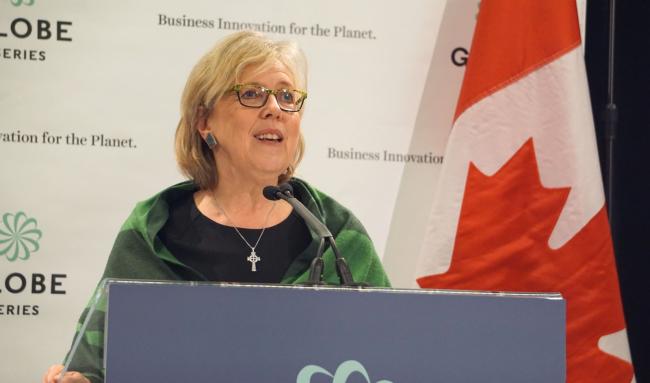Articles Menu

Green Party leader Elizabeth May calls on the federal Liberals to meet their climate action deadlines during the 2016 Globe Series in Vancouver, B.C. on Wed. March 2, 2016. Photo by Elizabeth McSheffrey.
Despite Prime Minister Justin Trudeau's insistence that pipelines will pay for Canada's transition to a low-carbon future, Green Party leader Elizabeth May said shipping diluted bitumen overseas will kill the country's climate action targets.
“We can’t be tying ourselves to bitumen and oilsands as an energy source for the future," she told reporters at the summit for sustainable business innovation.
"If you have an economic strategy for the oilsands that’s premised on high volumes of export on low-value product, you both ship jobs off-shore and drive up greenhouse gases. Those are inconsistent aims.”
While May appreciated Trudeau's appearance at the conference to begin with (he is the first prime minister attend so since Paul Martin in 2005), she called on the federal government to demonstrate bolder leadership on climate action.
As for its election promise, the deadline for coming up with a pan-Canadian framework on climate change — 90 days after the conclusion of COP21 in Paris — is March 12. It's time for the premiers to stop squabbling over their own economic interests, she said, and join in meaningful negotiations on carbon pricing.
"The premiers must now set aside narrow self-interest to endorse a new and more ambitious target for Canada," she explained. "Those renewed targets will pressure other countries to do more, and the global market will respond by increasingly betting on renewables and the future economy.”
Environment Minister Catherine McKenna recently announced that it would take another six months of consultations to come up with the framework, which is fine by May, as long as stronger greenhouse gas reduction targets come with it.
Even if all countries meet their below-two-degree global warming pledge negotiated in Paris, theUnited Nations has said that the planet would still experience an increase in global temperature ranging between 2.7 and 3.5 degrees Celsius.
"If we don’t have more aggressive targets soon in every country on Earth, we will be well past the danger zone and into a catastrophic range of climate impacts," she said, "potentially unstoppable, potentially runaway global warming.”